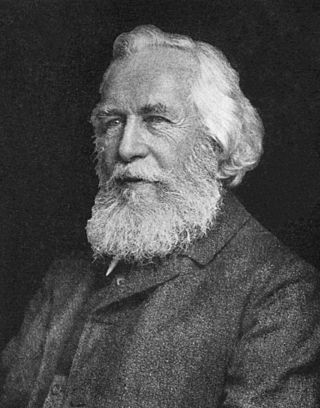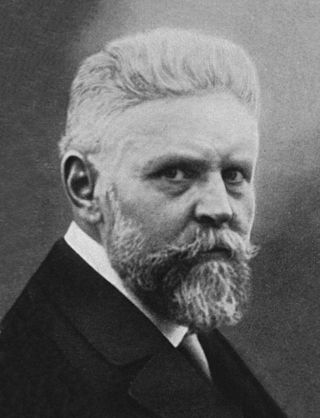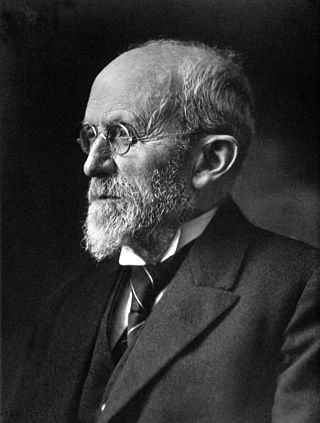Related Research Articles

Ernst Heinrich Philipp August Haeckel was a German zoologist, naturalist, eugenicist, philosopher, physician, professor, marine biologist and artist. He discovered, described and named thousands of new species, mapped a genealogical tree relating all life forms and coined many terms in biology, including ecology, phylum, phylogeny, and Protista. Haeckel promoted and popularised Charles Darwin's work in Germany and developed the influential but no longer widely held recapitulation theory claiming that an individual organism's biological development, or ontogeny, parallels and summarises its species' evolutionary development, or phylogeny.
Racism is discrimination and prejudice against people based on their race or ethnicity. Racism can be present in social actions, practices, or political systems that support the expression of prejudice or aversion in discriminatory practices. The ideology underlying racist practices often assumes that humans can be subdivided into distinct groups that are different in their social behavior and innate capacities and that can be ranked as inferior or superior. Racist ideology can become manifest in many aspects of social life. Associated social actions may include nativism, xenophobia, otherness, segregation, hierarchical ranking, supremacism, and related social phenomena.
Race is a categorization of humans based on shared physical or social qualities into groups generally viewed as distinct within a given society. The term came into common usage during the 16th century, when it was used to refer to groups of various kinds, including those characterized by close kinship relations. By the 17th century, the term began to refer to physical (phenotypical) traits, and then later to national affiliations. Modern science regards race as a social construct, an identity which is assigned based on rules made by society. While partly based on physical similarities within groups, race does not have an inherent physical or biological meaning. The concept of race is foundational to racism, the belief that humans can be divided based on the superiority of one race over another.
The Aryan race is an obsolete historical race concept that emerged in the late-19th century to describe people who descend from the Proto-Indo-Europeans as a racial grouping. The terminology derives from the historical usage of Aryan, used by modern Indo-Iranians as an epithet of "noble". Anthropological, historical, and archaeological evidence does not support the validity of this concept.
The concept of race as a categorization of anatomically modern humans has an extensive history in Europe and the Americas. The contemporary word race itself is modern; historically it was used in the sense of "nation, ethnic group" during the 16th to 19th centuries. Race acquired its modern meaning in the field of physical anthropology through scientific racism starting in the 19th century. With the rise of modern genetics, the concept of distinct human races in a biological sense has become obsolete. In 2019, the American Association of Biological Anthropologists stated: "The belief in 'races' as natural aspects of human biology, and the structures of inequality (racism) that emerge from such beliefs, are among the most damaging elements in the human experience both today and in the past."
Scientific racism, sometimes termed biological racism, is the pseudoscientific belief that the human species can be subdivided into biologically distinct taxa called "races", and that empirical evidence exists to support or justify racism, racial inferiority, or racial superiority. Before the mid-20th century, scientific racism was accepted throughout the scientific community, but it is no longer considered scientific. The division of humankind into biologically separate groups, along with the assignment of particular physical and mental characteristics to these groups through constructing and applying corresponding explanatory models, is referred to as racialism, race realism, or race science by those who support these ideas. Modern scientific consensus rejects this view as being irreconcilable with modern genetic research.
Cyril Dean Darlington was an English biologist, cytologist, geneticist, and eugenicist. He discovered the mechanics of chromosomal crossover, its role in inheritance, and therefore its importance to evolution. He was the Sherardian Professor of Botany at the University of Oxford from 1953 to 1971.
The Nordic race is an obsolete racial concept which originated in 19th-century anthropology. It was once considered a race or one of the putative sub-races into which some late-19th to mid-20th century anthropologists divided the Caucasian race, claiming that its ancestral homelands were Northwestern and Northern Europe, particularly to populations such as Anglo-Saxons, Germanic peoples, Balts, Baltic Finns, Northern French, and certain Celts and Slavs. The supposed physical traits of the Nordics included light eyes, light skin, tall stature, and dolichocephalic skull; their psychological traits were deemed to be truthfulness, equitability, a competitive spirit, naivete, reservedness, and individualism. In the early 20th century, the belief that the Nordic race constituted the superior branch of the Caucasian race gave rise to the ideology of Nordicism.

Alfred Ploetz was a German physician, biologist, Social Darwinist, and eugenicist known for coining the term racial hygiene (Rassenhygiene), a form of eugenics, and for promoting the concept in Germany.

Hans Friedrich Karl Günther was a German writer, an advocate of scientific racism and a eugenicist in the Weimar Republic and the Third Reich. He was also known as "Rassengünther" or "Rassenpapst". He is considered to have been a major influence on Nazi racialist thought.
Social interpretations of race regard the common categorizations of people into different races. Race is often culturally understood to be rigid categories in which people can be classified based on biological markers or physical traits such as skin colour or facial features. This rigid definition of race is no longer accepted by scientific communities. Instead, the concept of 'race' is viewed as a social construct. This means, in simple terms, that it is a human invention and not a biological fact. The concept of 'race' has developed over time in order to accommodate different societies' needs of organising themselves as separate from the 'other'. The 'other' was usually viewed as inferior and, as such, was assigned worse qualities. Our current idea of race was developed primarily during the Enlightenment, in which scientists attempted to define racial boundaries, but their cultural biases ultimately impacted their findings and reproduced the prejudices that still exist in our society today.

Richard Wilhelm Karl Theodor Ritter von Hertwig, also Richard Hertwig or Richard von Hertwig, was a German zoologist and professor of 50 years, notable as the first to describe zygote formation as the fusing of spermatozoa inside the membrane of an egg cell during fertilization. Richard Hertwig was the younger brother of Oscar Hertwig, who also analyzed zygote formation.
The American Association of Biological Anthropologists (AABA) is an international group based in the United States which affirms itself as a professional society of biological anthropologists. The organization publishes the American Journal of Biological Anthropology, a peer-reviewed science journal. It was formerly the American Association of Physical Anthropologists (AAPA), but changed its name after a series of votes between 2018 and 2020.

UNESCO has published several statements about issues of race.
Mongoloid is an obsolete racial grouping of various peoples indigenous to large parts of Asia, the Americas, and some regions in Europe and Oceania. The term is derived from a now-disproven theory of biological race. In the past, other terms such as "Mongolian race", "yellow", "Asiatic" and "Oriental" have been used as synonyms.
Karl Astel was an Alter Kämpfer, rector of the University of Jena, a racial scientist, and also involved in the German Nazi Eugenics program.
Negroid is an obsolete racial grouping of various people indigenous to Africa south of the area which stretched from the southern Sahara desert in the west to the African Great Lakes in the southeast, but also to isolated parts of South and Southeast Asia (Negritos). The term is derived from now-disproven conceptions of race as a biological category.

Anti-racism encompasses a range of ideas and political actions which are meant to counter racial prejudice, systemic racism, and the oppression of specific racial groups. Anti-racism is usually structured around conscious efforts and deliberate actions which are intended to create equal opportunities for all people on both an individual and a systemic level. As a philosophy, it can be engaged in by the acknowledgment of personal privileges, confronting acts as well as systems of racial discrimination and/or working to change personal racial biases. Major contemporary anti-racism efforts include the Black Lives Matter (BLM) movement and workplace anti-racism.

Jena Phyletisches Museum is a museum in the German town of Jena. It was established by the scientist Ernst Haeckel, as an institute dedicated to explaining evolution to the public. Exhibits include skeletons, stuffed animals, fossils and zoological artworks from Haeckel's Kunstformen der Natur, and cover topics including the principles of evolution, biodiversity and the links between different taxonomic groups.
The German Zoological Society is a learned society in Germany, founded in 1890 at Frankfurt am Main. It is registered as a non-profit organisation based in Munich.
References
- 1 2 Jena Declaration Contributes to Amendment of German Constitution. Max Planck Institute for the History of Man, accessed 23 June 2023..
- ↑ Nachrichten Informationsdienst Wissenschaft (2019-09-10). "'Human races' do not exist". nachrichten.idw-online.de (in German). Retrieved 2023-11-15.
- 1 2 Witting, Volker (June 13, 2020). "Germany's heated debate over 'race' in the constitution – DW – 06/13/2020". dw.com. Retrieved 2023-11-15.
- ↑ mdr.de: Jenaer Forscher: Menschenrassen gibt es nicht | MDR.DE. Accessed 6 July 2023.
- 1 2 Max Planck Institute of Geoanthropology (2019-09-10). "Jenaer Erklärung". www.shh.mpg.de. Retrieved 2023-11-15.
- ↑ Karl Porges: . Verlag Julius Klinkhardt, Bad Heilbrunn 2023, ISBN 978-3-7815-6008-6, doi : 10.35468/6008.
- ↑ Karl Porges, Uwe Hoßfeld: . Ed.: Thüringer Ministerium für Bildung, Jugend und Sport. Erfurt 2023, ISBN 978-3-9821193-7-3 (thueringen.de [PDF]).
- ↑ IQWiG (The independent Institute for Quality and Efficiency in Health Care) (2020-02-10). "IQWiG supports the "Jena Declaration" | IQWiG.de". IQWiG. Retrieved 2023-11-15.